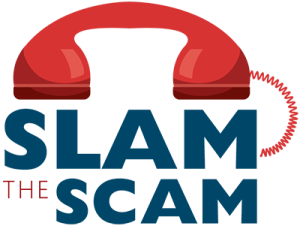

The Social Security Administration Office of the Inspector General is ready to #SlamTheScam on March 10, the third annual National Slam the Scam Day! Slam the Scam Day is part of National Consumer Protection Week hosted by the Federal Trade Commission from March 6-12. The goal is to raise public awareness of government imposter and other scams.
How do you know it’s a scam?
If you receive a call, text, or email that…
- threatens to suspend your Social Security number, even if they have all or part of your Social Security number
- warns of arrest or legal action
- demands or requests immediate payment
requires payment by gift card, prepaid debit card, internet currency, or by mailing or dropping off cash - pressures you for personal information
- requests secrecy
- threatens to seize your bank account
- promises to increase your Social Security benefit
- tries to gain your trust by providing fake “documentation”, false “evidence”, or the name of a real government official
… it’s a scam!
If you receive a suspicious call, text, or email, hang up or do not respond. Government employees will NEVER threaten you or demand immediate payment. Watch how two people handle these calls and learn what you can do to avoid government imposter scams.
How to report a scam
Reporting scams is also important, even if you don’t lose any money. Reporting adds information to national databases, which can help track scammers and stop them. Report scams here:
All Scams:
FBI’s Internet Crime Complaint Center (IC3) at www.IC3.gov/Home/FileComplaint or call the FBI’s Grand Rapids Office at 616-456-5489
and
Federal Trade Commission at www.reportfraud.ftc.gov or 877-382-4357
Social Security Scams:
https://oig.ssa.gov/scam-awareness/report-the-scam/ or 800-772-1213
To learn more about other imposter scams and various types of abuse, neglect and exploitation, visit https://safeseniors.info/outreach-materials-and-presentations/.
Together, we can Slam the Scam!

